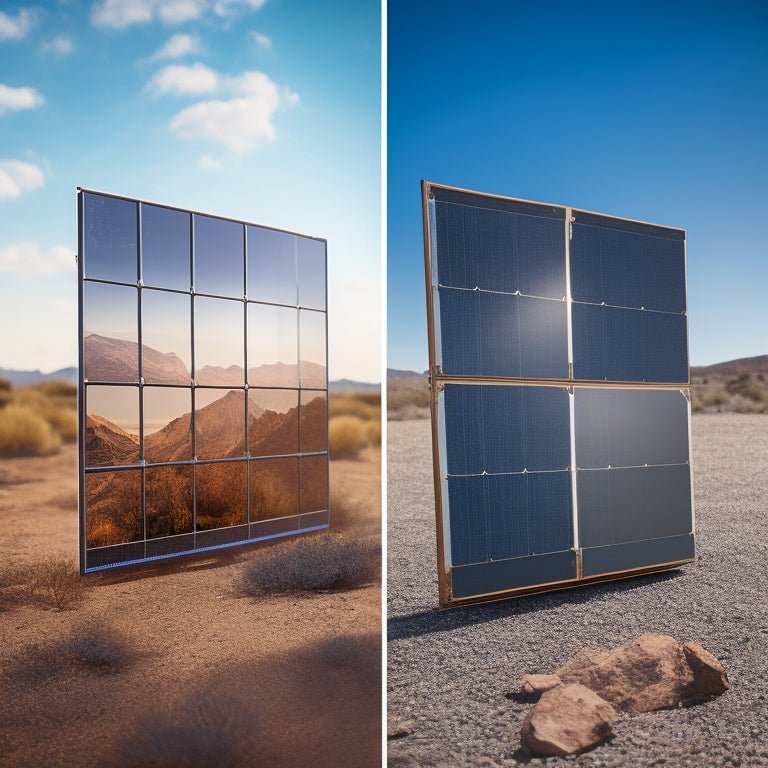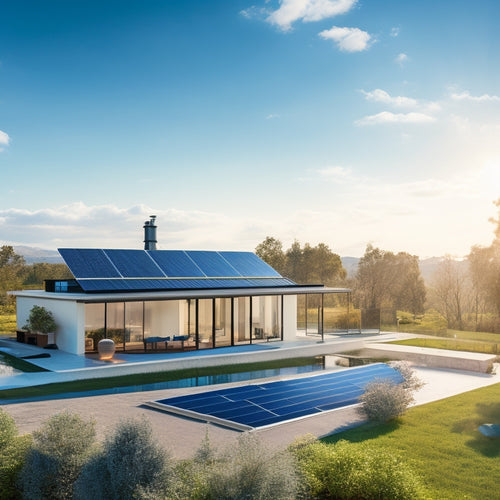
Why Cheap Solar Panels Aren't Always the Best
Share
When opting for cheap solar panels, you're likely sacrificing quality and reliability for upfront savings. However, you'll likely end up paying more in the long run due to hidden costs and drawbacks. Cheap panels often use low-quality materials, leading to reduced efficiency, increased maintenance needs, and a shorter lifespan. You may also face limited warranty and support, installation and maintenance issues, and even a negative impact on your home's resale value. As you weigh the costs, contemplate that the initial savings might not be worth the long-term financial burden - and there's more to mull over when making an informed decision.
Key Takeaways
• Cheap solar panels may compromise on material quality, leading to reduced efficiency, shorter lifespan, and increased maintenance needs.
• Lower-quality materials can increase the risk of costly repairs, system failures, and electrical hazards, outweighing initial savings.
• Manufacturers with limited warranties and poor support may leave customers with significant financial burdens and compromised energy security.
• Inexpensive solar panels can negatively impact a home's resale value, affecting appraisal and neighborhood aesthetics.
• The long-term costs of frequent replacements, increased maintenance, and energy insecurity can negate any short-term savings from cheap solar panels.
Hidden Costs of Cheap Panels
When you opt for cheap solar panels, you may inadvertently sign up for a multitude of hidden costs that can negate the initial savings. One important aspect to take into account is the certification importance of the panels. A reputable manufacturer will make certain their products meet industry standards, such as UL certification, which guarantees a certain level of quality and performance. Cheap panels might lack these certifications, putting your entire system at risk.
A manufacturer's reputation is also vital in this regard. A well-established company with a proven track record will typically offer better warranties, customer support, and overall quality. Be cautious of unknown or inexperienced manufacturers, as they may cut corners to keep costs low. This can result in subpar materials, poor construction, and reduced efficiency.
In the long run, these 'savings' can lead to costly repairs, replacements, or even system failures. By prioritizing certification importance and manufacturer reputation, you can avoid these hidden costs and ensure a reliable, efficient, and powerful solar panel system.
Lower Efficiency Means Less Power
You'll likely generate less power overall with cheap solar panels, which often have lower efficiencies that translate to reduced energy output. This means that for the same amount of sunlight, cheaper panels will produce less electricity than high-efficiency panels. As a result, you'll need more panels to achieve the same power output, taking up more space and potentially increasing installation costs.
Here are some key implications of lower efficiency:
-
Energy losses: With lower efficiency, more energy is lost as heat, reducing the overall power output of your system.
-
Reduced power output: Lower efficiency means you'll get less power per hour of sunlight, resulting in lower overall energy production.
-
Increased space requirements: To achieve the same power output, you'll need more panels, which can increase installation costs and take up more space.
Shorter Lifespan of Cheap Systems
When you choose inexpensive solar panels, you're likely compromising on the quality of materials used. This can lead to a shorter lifespan for your system, which means you'll need to perform more frequent maintenance and potentially deal with premature system failures.
As you consider the true cost of cheap solar panels, it's crucial to weigh these potential drawbacks against the initial savings.
Lower Quality Materials Used
Cheap solar panels often incorporate lower-quality materials, compromising the system's durability and resulting in a shorter lifespan. You might think you're saving money upfront, but in the long run, you'll be paying for it.
Manufacturers of cheap solar panels often take shortcuts to reduce costs, which can lead to a shorter system lifespan. This means you'll need to replace the system more frequently, incurring costly replacements.
Some common examples of lower-quality materials used in cheap solar panels include:
- Thin, low-grade glass or plastic that's more prone to cracking or shattering
- Low-purity silicon that reduces energy conversion efficiency
- Subpar inverters that can fail prematurely, causing system downtime and energy losses
These manufacturing shortcuts might save the manufacturer money, but they'll end up costing you in the long run.
Increased Maintenance Needs
With a shorter lifespan, cheap solar panels require more frequent inspections, repairs, and replacements, leading to increased maintenance needs that can quickly add up in regards to time, money, and hassle. You'll need to budget for regular cleaning to guarantee peak energy production, as dirt and debris can reduce efficiency by up to 25%. Preventive checks are also vital to identify potential issues before they become major problems.
| Maintenance Task | Frequency | Cost |
|---|---|---|
| Regular cleaning | Every 6 months | $100-$300 |
| Preventive checks | Quarterly | $200-$500 |
| Replacement of faulty components | As needed | $500-$1,000 |
These maintenance costs can add up quickly, and may even negate any initial cost savings from buying cheap solar panels. Moreover, frequent repairs and replacements can lead to downtime, reducing the overall energy output of your system. When considering cheap solar panels, it's crucial to factor in the long-term maintenance costs to get a true picture of the total cost of ownership.
Premature System Failure
You'll likely face premature system failure with cheap solar panels, which can lead to a shorter lifespan and additional costs down the line. This is often due to system design flaws, which can cause electrical overstressing that reduces the overall lifespan of your solar panel system. When you opt for cheap solar panels, you may be sacrificing quality for cost, and it can come back to haunt you in the long run.
Some common issues that can lead to premature system failure include:
-
Inadequate temperature tolerance: Cheap solar panels may not be designed to withstand extreme temperatures, leading to reduced efficiency and lifespan.
-
Low-quality components: Using low-cost materials can lead to electrical overstressing, corrosion, and other issues that can cause system failure.
-
Poor assembly and installation: Rushed or inadequate installation can lead to electrical connections that are prone to overheating, arcing, or corrosion, further reducing the system's lifespan.
Poor Quality Materials Used
Manufacturers of cheap solar panels often sacrifice quality by using low-grade photovoltaic cells that are more prone to degradation and failure. You might think you're saving money upfront, but in the long run, you'll pay the price. Subpar manufacturing processes and corner-cutting suppliers can lead to solar panels that don't meet industry standards. This can result in reduced energy output, shortened lifespan, and even complete system failure.
When you opt for cheap solar panels, you risk getting low-efficiency cells that can't harness sunlight as effectively. This means you'll need more panels to generate the same amount of power, increasing your overall cost. Additionally, these low-quality cells are more susceptible to heat, moisture, and other environmental stressors, which can cause them to degrade rapidly. As a result, your solar panel system may not last as long as you expect, forcing you to replace it sooner rather than later.
Limited Warranty and Support
When you're shopping for solar panels, you might be tempted to opt for the cheapest option, but you should consider the long-term implications of a limited warranty and support.
You'll want to think carefully about the warranty's length and what it actually covers, as well as the availability of the manufacturer's support team in case you need help down the line.
Warranty Length Matters
Considering your investment in solar panels, a lengthy warranty period can provide peace of mind, as it guarantees the manufacturer's commitment to supporting their products for an extended duration. You want to make sure that your solar panels will perform at their best for years to come, and a thorough warranty can give you that assurance.
When evaluating solar panels, look for manufacturers that offer a minimum 25-year warranty on their products. This duration is seen as an industry standard, and reputable manufacturers will stand behind their products for at least that long.
Here are some key aspects to keep in mind:
- Manufacturer reputation: A reputable manufacturer will offer a longer warranty period, as they're confident in their product's quality and performance.
- Industry standards: Look for manufacturers that meet or exceed industry standards for warranty periods, as this indicates a dedication to quality and customer support.
- Full coverage: Ensure that the warranty covers not just the product itself but also labor and transportation costs in case of repairs or replacements.
Hidden Costs Exposed
Beyond the advertised price of the solar panels, you'll need to factor in the potential costs of limited warranty and support, which can add up quickly if you're not careful. When evaluating the true cost of a solar panel system, it's important to take into account the hidden costs of limited warranty and support. This lack of transparency can lead to financial deception, obscuring the actual cost of the system.
| Warranty Length | Support Response Time | Cost of Replacement Parts |
|---|---|---|
| 5 years | 3-5 business days | $500-$1,000 |
| 10 years | 1-3 business days | $200-$500 |
| 15 years | 24/7 emergency support | $100-$200 |
| 20 years | 24/7 emergency support | $50-$100 |
| 25 years | 24/7 emergency support | $0-$50 |
Energy transparency is important when evaluating solar panel systems. Be cautious of manufacturers that don't provide clear information on warranty and support costs. By taking into consideration these hidden costs, you can make an informed decision and avoid financial deception. Remember, a cheaper upfront cost doesn't always mean a better deal in the long run.
Support Team Availability
When evaluating the support team's availability, you'll find that manufacturers with limited warranties often have slower response times, leaving you waiting for days or even weeks for assistance. This can be frustrating, especially when you're dealing with a critical issue that's affecting your energy output.
When assessing a solar panel manufacturer, it's crucial to examine their support team's availability and response time expectations.
Here are a few key factors to keep in mind:
-
Response Time Expectations: Look for manufacturers that offer 24/7 support or guarantee a response within a certain timeframe (e.g., 2 hours, 4 hours, etc.).
-
Support Language Options: Confirm the manufacturer offers support in your language, reducing the risk of miscommunication and ensuring you receive effective assistance.
-
Multichannel Support: Opt for manufacturers that provide support through various channels, such as phone, email, and live chat, to cater to your preferred communication method.
Installation and Maintenance Issues
You may think you're saving money upfront with cheap solar panels, but you'll likely be trading off on installation and maintenance quality, which can lead to costly problems down the road. When you opt for cheaper panels, you may be sacrificing proper installation, which can result in electrical shock hazards or even fires. In addition, inverter compatibility issues can arise, causing your system to malfunction or shut down entirely. This can lead to extended periods of downtime, resulting in lost energy production and revenue.
In addition, maintenance becomes a significant concern with cheap solar panels. You may find yourself dealing with frequent repairs or replacements, which can be costly and time-consuming. Furthermore, manufacturers of cheap solar panels often lack reliable customer support, leaving you to navigate complex technical issues on your own. This can be frustrating and overwhelming, especially if you're not familiar with solar panel systems.
Affecting Your Home's Resale Value
Inexpensive solar panels can greatly diminish your home's resale value, as prospective buyers may view them as a liability rather than a valuable asset. When considering installing solar panels, it's essential to think about the long-term implications on your property's value.
Cheap solar panels can raise appraisal concerns, as their low quality and aesthetics may negatively impact your home's overall appeal.
Here are some key considerations to keep in mind:
-
Appraisal concerns: Low-quality solar panels can lead to a lower appraised value, which can affect your ability to sell your home or refinance your mortgage.
-
Neighborhood impact: Cheap solar panels can be an eyesore, affecting the overall aesthetic appeal of your neighborhood and potentially decreasing property values.
-
Buyer perception: Prospective buyers may view cheap solar panels as a sign of a 'cheap' or low-quality home, making them less likely to make an offer.
Long-Term Savings Are a Myth
Cheap solar panels' promise of long-term savings often rings hollow, as their subpar quality and shorter lifespan can lead to increased maintenance costs and replacement expenses down the line.
You might think you're saving money upfront, but in reality, you're setting yourself up for a financial burden in the long run. With a shorter lifespan, you'll need to replace these cheap panels more frequently, which can add up quickly. This not only drains your wallet but also undermines your energy security.
When you choose cheap solar panels, you're effectively trading short-term savings for long-term headaches. Instead of enjoying the benefits of renewable energy, you'll be stuck dealing with the consequences of a poorly made system.
The initial cost savings will be eclipsed by the constant need for repairs, replacements, and maintenance. In the end, you'll be left with a system that can't provide the energy security you need, leaving you vulnerable to rising energy costs.
Frequently Asked Questions
Can I Mix and Match Different Solar Panel Brands on My Roof?
When mixing and matching solar panels on your roof, you'll face roof aesthetics concerns, potential warranty issues, and varying panel efficiency, which can lead to installation challenges and reduced system performance, impacting your overall energy output.
Are Cheap Solar Panels Compatible With Energy Storage Systems?
As you consider cheap solar panels, you wonder if they're compatible with energy storage systems. The answer lies in system integration and battery compatibility - will your chosen panels seamlessly connect with your energy storage setup, or will it be a costly headache?
Do Cheap Solar Panels Require More Frequent Cleaning?
You'll find that cheap solar panels are more prone to dirt accumulation, reducing panel efficiency over time, which means you'll need to clean them more frequently to maintain peak energy output.
Can I Install Cheap Solar Panels Myself to Save Money?
'Coincidentally, you're considering DIY solar installation to save bucks, but beware: a DIY fiasco can lead to safety risks, electrical shocks, and even fires. Leave it to certified pros to guarantee a hassle-free, efficient installation.'
Will Cheap Solar Panels Affect My Homeowner's Insurance Rates?
Reviewing your policy and consulting with your insurer beforehand is crucial when considering how cheap solar panels may impact your homeowner's insurance rates. This is because insurance premiums might increase due to policy exclusions or limitations.
Related Posts
-

5 Key Components of EV Charging Infrastructure
When building an EV charging infrastructure, you'll need to focus on five key components. First, a reliable power dis...
-

Top Mountain Bike Electric Conversion Systems
When upgrading your mountain bike with an electric conversion system, you can choose from top brands like Mountain Tr...
-

Why Opt for High-Efficiency Solar Panels Online?
You can greatly enhance your solar energy output and savings by upgrading to high-efficiency solar panels, which can ...


